|
Listed by department. See
other faculty achievements in
Top
Stories.
RESEARCHERS HONORED AS INNOVATORS
Eleven innovators from the
College of Medicine, including 10 from the Department of Biomedical
Sciences, were honored in December at the Office of Intellectual Property
Development and Commercialization’s Seventh Annual Innovators Reception.
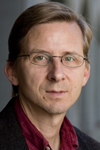
In alphabetical order, the honorees were Research Assistant Professor
Ewa Bienkiewicz, Ph.D.; Professor Michael Blaber,
Ph.D.; Research Specialist Kate Calvin, Ph.D.; Professor
(and Senior Associate Dean for Research and Graduate Programs) Myra
Hurt, Ph.D.; Professor (and Associate Dean for Medical Education)
Mary Johnson, Ph.D.; Assistant Professor Sanjay
Kumar, Ph.D.; Associate Professor Tim
Megraw, Ph.D. (pictured at left); Associate Professor James
Olcese,
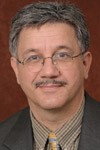 Ph.D.;
postdoctoral associate Raed Rizkallah, Ph.D.; and Associate
Professor Branko Stefanovic, Ph.D., all from Biomedical
Sciences; and Assistant Professor Stephen Quintero, M.D.
(pictured at right), from the Department of Family Medicine and Rural
Health. Ph.D.;
postdoctoral associate Raed Rizkallah, Ph.D.; and Associate
Professor Branko Stefanovic, Ph.D., all from Biomedical
Sciences; and Assistant Professor Stephen Quintero, M.D.
(pictured at right), from the Department of Family Medicine and Rural
Health.
Researchers from across the campus were recognized for their
work in the fiscal year ending June 30.
Find out the specifics of these innovators’ projects.
BIOMEDICAL SCIENCES
The lab group
of Myra Hurt, Ph.D., senior associate dean for research and
graduate programs, has had a paper published. “Phosphorylation of
the Transcription Factor YY1 by CK2α Prevents Cleavage by Capase 7 during
Apoptosis” was published in Molecular and Cellular Biology.
The authors were graduate student Sarah Riman; postdoctoral
associate Raed Rizkallah, Ph.D.; graduate
student Ari Kassardjian; Beth
Alexander, Hurt’s research coordinator; Bernhard Luescher,
professor and researcher in Aachen, Germany; and Hurt.
Department Chair Richard Nowakowski,
Ph.D., was emcee for The Bu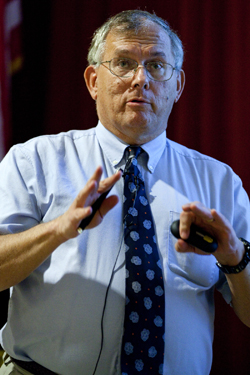 siness
of Life Sciences Symposium in Tallahassee in November. A top-notch group of
speakers and panelists helped researchers explore ways to translate their
lab discoveries into tangible products in the marketplace. The symposium was
sponsored and organized by the FSU Office of Intellectual Property
Development and Commercialization; the Office of Research; and the Life
Sciences Faculty Commercialization Roundtable, which Nowakowski co-founded.
“Translating FSU’s basic research into scientific breakthroughs that help a
patient directly can happen best with work across disciplines, industry and
the government,” he said. siness
of Life Sciences Symposium in Tallahassee in November. A top-notch group of
speakers and panelists helped researchers explore ways to translate their
lab discoveries into tangible products in the marketplace. The symposium was
sponsored and organized by the FSU Office of Intellectual Property
Development and Commercialization; the Office of Research; and the Life
Sciences Faculty Commercialization Roundtable, which Nowakowski co-founded.
“Translating FSU’s basic research into scientific breakthroughs that help a
patient directly can happen best with work across disciplines, industry and
the government,” he said.
Professor Mike Overton, M.D., had a
paper published online by the American Journal of Physiology-Regulatory
Integrative and Comparative Physiology. The paper, “Evidence for the
role of Hindbrain orexin-1 receptors in the control of meal size,” appeared
in the December 2011 publication (Volume 301).
Assistant in Medicine
Jake VanLandingham, Ph.D., received partial funding for his
GAP proposal: “Use of Progesterone and its Enantiomer to Better Outcomes
Associated with Concussion.”
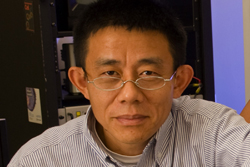
In November, the lab of Associate
Professor Yi Zhou, Ph.D. (pictured
here), had a paper accepted for publication. The paper, “Determining nuclear
localization of Alpha-synuclein in mouse brains,” was accepted by
Neuroscience. Those who collaborated on it were Zhiling Huang
(postdoc), Zhe Xu (graduate student), Dr. Yuying Wu
and Zhou.
FAMILY MEDICINE AND RURAL HEALTH
Director of
Rural Health Maggie Blackburn, M.D., helped secure a
capital-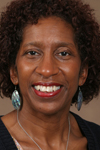 improvement
grant of just under $500,000 for a community program that’s working to
enhance the school-based health centers in Gadsden County. The group is
ICAN/ICAN TOO, based in Havana. It has assembled a coalition that includes
not only the College of Medicine but also the FSU College of Nursing, the
Florida A&M University Provost’s Office, the Gadsden School District, the
Gadsden Health Department and many community volunteers. One of its projects
has been the Havana Health and Wellness Center, which opened in August –
joining two other school-based clinics in Quincy. Blackburn said the federal
Health Resources and Services Administration grant will pay to purchase and
upgrade equipment; repair and renovate clinic spaces; purchase an electronic
health record system; and install dental suites in all three clinics.
Quincy’s school-based health centers opened in 2007 with funding provided
through the Children’s Miracle Network and generated by FSU students through
Dance Marathon. FSU medical school faculty, medical students and psychology
graduate students work in the centers part time. improvement
grant of just under $500,000 for a community program that’s working to
enhance the school-based health centers in Gadsden County. The group is
ICAN/ICAN TOO, based in Havana. It has assembled a coalition that includes
not only the College of Medicine but also the FSU College of Nursing, the
Florida A&M University Provost’s Office, the Gadsden School District, the
Gadsden Health Department and many community volunteers. One of its projects
has been the Havana Health and Wellness Center, which opened in August –
joining two other school-based clinics in Quincy. Blackburn said the federal
Health Resources and Services Administration grant will pay to purchase and
upgrade equipment; repair and renovate clinic spaces; purchase an electronic
health record system; and install dental suites in all three clinics.
Quincy’s school-based health centers opened in 2007 with funding provided
through the Children’s Miracle Network and generated by FSU students through
Dance Marathon. FSU medical school faculty, medical students and psychology
graduate students work in the centers part time.
Assistant
Professor Meredith Goodwin, M.D., took over as the 932nd
Medical Squadron’s newest commander Jan. 21, during an Assumption of Command
Ceremony at Scott Air Force Base. Goodwin was promoted to colonel in the
U.S. Air Force Reserve in September.
Transformation Through Teaching honors full-time
FSU faculty members who’ve had an intellectual, inspirational and
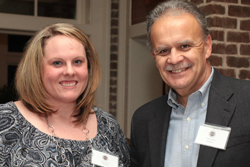 integrative
impact on the lives of their students. In November, Associate Chair
Curt Stine, M.D., was one of 19 faculty members across campus
recognized on
the basis of students’ compelling stories. In Stine’s case, the story came
from Laura Davis (Class of 2013, Pensacola campus). Here is
an excerpt from Davis: integrative
impact on the lives of their students. In November, Associate Chair
Curt Stine, M.D., was one of 19 faculty members across campus
recognized on
the basis of students’ compelling stories. In Stine’s case, the story came
from Laura Davis (Class of 2013, Pensacola campus). Here is
an excerpt from Davis:
“When I started medical school, I immediately became
involved in numerous campus organizations. I volunteered at a local church
and saw Dr. Stine working there. I volunteered at the homecoming 5K and saw
Dr. Stine working there, too. I remember being intrigued as to how he could
find time to do so much. Later, I realized why it was so easy for him.
Medicine is not a job that you turn off when you leave the office. It is not
just a career; rather, it is a lifestyle. I realized that Dr. Stine was
involved because service is his passion, too. It is a part of his character,
and when I realized this, it changed the purpose of my medical education,
too. I was not sitting in class and studying long hours just to be a
physician, but to be able to serve others in a way that not many people were
trained or able to do.”
MEDICAL
HUMANITIES AND SOCIAL SCIENCES
Late in 2011, a
window-filled corridor in the College of Medicine became a temporary art
gallery, displaying 10 works by nationally
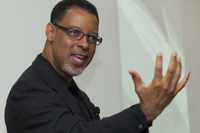 renowned Gadsden County artist
Dean Mitchell. The exhibition did much more than beautify a blank
wall. The people in those portraits could well be the medical students’ future patients. renowned Gadsden County artist
Dean Mitchell. The exhibition did much more than beautify a blank
wall. The people in those portraits could well be the medical students’ future patients.
Mitchell’s work is celebrated far beyond North Florida. His
paintings are included in the permanent collection of 13 art museums across
the U.S. and the Library of Congress, and he’s represented by six
private art galleries from California to Mississippi. He has more
than 400 awards for his work, and his paintings of jazz musicians were
turned into postage stamps.
But
Gadsden County is where Mitchell grew up and where much of his art springs
from. The 10 paintings had been part of his recent “Rich in Spirit”
exhibition at the Gadsden Arts Center. That was where Janine Edwards,
Ph.D., chair of the Department of Medical Humanities and Social Sciences, saw them
and was immediately inspired.
“The mission of the FSU College of
Medicine focuses on serving the underserved populations of Florida,” she
wrote when she planned the College of Medicine exhibition. “Mitchell’s works
illustrate the lives of these people.”
In January, just before the
paintings came down, the artist himself visited the College of Medicine to
talk about his work and his home county. He was introduced by Senior
Associate Dean for Medical Education and Academic Affairs Alma Littles,
M.D., a fellow graduate of James A. Shanks High School in Quincy and a
longtime admirer of his art. For years, she said, “I have had the
opportunity to discuss his paintings of tobacco barns, scenes of nature and
facial expressions with his high school classmates and others in Quincy who
could relate directly to the paintings.”
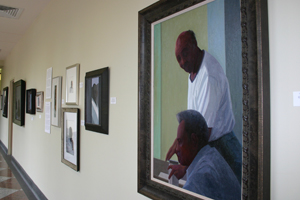
She quoted remarks by Grace Maloy, executive director of the
Gadsden Arts Center, speculating about what makes Mitchell great: “Dean Mitchell has
enormous talent; he is also very intelligent, perceptive, empathetic, and he
loves people. Dean learned from his grandmother, Marie, and childhood
experiences in Quincy to value the intangible, and to have a tremendous work
ethic and strength of character.”
Exhibition produced in partnership with the Gadsden Arts Center, Quincy,
Fla. Many thanks to Executive Director Grace Maloy and Curator Angie Barry.
ADMINISTRATION
Alma
Littles,
M.D., senior associate dean for medical education and academic affairs, was
among the North Florida notables honored in Tallahassee Community College’s African-American History Calendar
for 2012. For 12 years, the calendar has highlighted the achievements of
African-Americans in Leon and surrounding counties.
Littles, who
grew up in Gadsden County, earned her medical degree from the University of
Florida College of Medicine. She is past president of both the Florida
Academy of Family Physicians and Capital Medical Society, as well as former
director of the family medicine residency program at Tallahassee Memorial
Hospital.
CENTER FOR INNOVATIVE
COLLABORATION
IN
MEDICINE & LAW
The center has been awarded a grant under the
Retirement Research Foundation POLST Innovative States Award initiative.
Ken Brummel-Smith, M.D., chair of the Department of
Geriatrics, and Marshall Kapp, J.D., MPH, director of the
center, have been designated co-principal investigators. The vision of POLST
(Physician Orders for Life-Sustaining Treatment) is to ensure that seriously
ill people’s wishes regarding life-sustaining treatments are known,
communicated and honored across all health-care settings. Said Kapp: “This
financial support, plus (even more importantly) the national recognition of
our efforts that the award signifies, will help us greatly in moving POLST
forward in this state.”
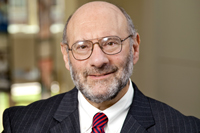 In
November, Kapp presented “Beyond Advance Directives:
Physician Orders for Life-Sustaining Treatment (POLST)” as part of a Boston
symposium titled “Aging and Advance Care Planning” at the Annual Scientific
Meeting of the Gerontological Society of America. In
November, Kapp presented “Beyond Advance Directives:
Physician Orders for Life-Sustaining Treatment (POLST)” as part of a Boston
symposium titled “Aging and Advance Care Planning” at the Annual Scientific
Meeting of the Gerontological Society of America.
In January Kapp
presented “Innovative Collaboration in Medicine and Law: The Ivory
Tower as a Strategic Advantage” as part of a panel on Reaching
Out Beyond the Classroom: Health Law Professors Interacting With the Real
World. It was sponsored by the section on law, medicine and health care at
the annual meeting of the Association of American Law Schools in Washington,
D.C. He also presented a paper titled “If We Can Force People to Purchase
Health Insurance, Then Let’s Force Them to Be Treated Too” at a symposium
sponsored by the American Journal of Law & Medicine and Boston University
School of Law on the theme of “The American Right to Health: Constitutional,
Statutory, and Contractual Healthcare Rights in the United States.”
Kapp also was appointed to the Board of
Directors of Kendal Outreach LLC, the outreach arm of Kendal Corp., a
progressive nonprofit long-term care and retirement community.
FORT PIERCE REGIONAL CAMPUS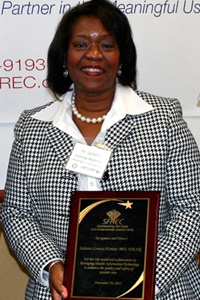
Juliette
Lomax-Homier, M.D., a clerkship director at the Fort Pierce campus,
was one of two St. Lucie County OB-GYNs recognized recently
for their use of certified electronic medical records. She and Leigh Hoppe,
M.D., operate Just Ladies Healthcare of the Treasure Coast in Fort Pierce.
They were saluted by the Office of the National Coordinator of Health
Information Technology as well as the South Florida Regional Extension
Center. They also have received financial incentive funding from the Centers
for Medicare and Medicaid Services for their achievement.
ORLANDO
REGIONAL CAMPUS
Michael Muszynski, M.D., dean of the
Orlando campus, has been named secretary of the Orange County Medical
Society.
SARASOTA REGIONAL CAMPUS
Nicole Bentze, D.O., family medicine clerkship
director for the Sarasota campus, was named Part-Time Educator of the Year
by the Florida Academy of Family Physicians.
FLORIDA
CENTER FOR UNIVERSAL
RESEARCH TO ERADICATE DISEASE
FL CURED, which operates within
the College of Medicine, recently helped develop Florida’s first Health
Disparities Research Agenda, which outlines a research plan for achieving
health equity for all Floridians. Working in partnership with FL CURED are
the Florida Department of Health’s Office of Minority Health and the
Biomedical Research Advisory Council, in coordination with 31 of the state’s
top health disparities researchers.
Floridians of various
ethnic/racial backgrounds have higher proportions
of heart and other cardiovascular diseases, diabetes, cancer, HIV/AIDS and
infant mortality. The Health Disparities Research Agenda links academic institutions, health-care providers, and government,
community-based and faith-based organizations. Florida Surgeon General Frank
Farmer, M.D., Ph.D., called it “the first step of public and private health
researchers moving forward on a path together to improve the health of
underserved groups.”
FL CURED is sponsored by
the Florida Department of Health. Its principal investigator is
Michael Smith, and its executive director is Mike Devine,
Ph.D.
The report on the Health Disparities Research Agenda can be
found on DOH’s website.
|





 Ph.D.;
postdoctoral associate Raed Rizkallah, Ph.D.; and Associate
Professor Branko Stefanovic, Ph.D., all from Biomedical
Sciences; and Assistant Professor Stephen Quintero, M.D.
(pictured at right), from the Department of Family Medicine and Rural
Health.
Ph.D.;
postdoctoral associate Raed Rizkallah, Ph.D.; and Associate
Professor Branko Stefanovic, Ph.D., all from Biomedical
Sciences; and Assistant Professor Stephen Quintero, M.D.
(pictured at right), from the Department of Family Medicine and Rural
Health. 
 improvement
grant of just under $500,000 for a community program that’s working to
enhance the school-based health centers in Gadsden County. The group is
ICAN/ICAN TOO, based in Havana. It has assembled a coalition that includes
not only the College of Medicine but also the FSU College of Nursing, the
Florida A&M University Provost’s Office, the Gadsden School District, the
Gadsden Health Department and many community volunteers. One of its projects
has been the Havana Health and Wellness Center, which opened in August –
joining two other school-based clinics in Quincy. Blackburn said the federal
Health Resources and Services Administration grant will pay to purchase and
upgrade equipment; repair and renovate clinic spaces; purchase an electronic
health record system; and install dental suites in all three clinics.
Quincy’s school-based health centers opened in 2007 with funding provided
through the Children’s Miracle Network and generated by FSU students through
Dance Marathon. FSU medical school faculty, medical students and psychology
graduate students work in the centers part time.
improvement
grant of just under $500,000 for a community program that’s working to
enhance the school-based health centers in Gadsden County. The group is
ICAN/ICAN TOO, based in Havana. It has assembled a coalition that includes
not only the College of Medicine but also the FSU College of Nursing, the
Florida A&M University Provost’s Office, the Gadsden School District, the
Gadsden Health Department and many community volunteers. One of its projects
has been the Havana Health and Wellness Center, which opened in August –
joining two other school-based clinics in Quincy. Blackburn said the federal
Health Resources and Services Administration grant will pay to purchase and
upgrade equipment; repair and renovate clinic spaces; purchase an electronic
health record system; and install dental suites in all three clinics.
Quincy’s school-based health centers opened in 2007 with funding provided
through the Children’s Miracle Network and generated by FSU students through
Dance Marathon. FSU medical school faculty, medical students and psychology
graduate students work in the centers part time. integrative
impact on the lives of their students. In November, Associate Chair
Curt Stine, M.D., was one of 19 faculty members across campus
recognized on
the basis of students’ compelling stories. In Stine’s case, the story came
from Laura Davis (Class of 2013, Pensacola campus). Here is
an excerpt from Davis:
integrative
impact on the lives of their students. In November, Associate Chair
Curt Stine, M.D., was one of 19 faculty members across campus
recognized on
the basis of students’ compelling stories. In Stine’s case, the story came
from Laura Davis (Class of 2013, Pensacola campus). Here is
an excerpt from Davis: renowned Gadsden County artist
Dean Mitchell. The exhibition did much more than beautify a blank
wall. The people in those portraits could well be the medical students’ future patients.
renowned Gadsden County artist
Dean Mitchell. The exhibition did much more than beautify a blank
wall. The people in those portraits could well be the medical students’ future patients.
